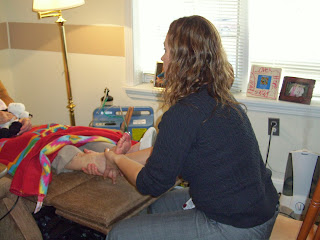 I'd like to share a bit about grieving children. I frequently talk to parents and other adults who are concerned about children in hospice families. Naturally, adults tend to be protective of their children and when a family member is dying, this protectiveness tends to intensify.
I'd like to share a bit about grieving children. I frequently talk to parents and other adults who are concerned about children in hospice families. Naturally, adults tend to be protective of their children and when a family member is dying, this protectiveness tends to intensify. If you are struggling with breaking the news to a child that a family member is terminally ill, keep in mind your child may already be aware that something is going on - often children know much more than we give them credit for.
Though they may not have been explicitly told yet, children are very good at picking up information from conversations around them. Kids are typically aware of death in general. Remember when you were young, watching Saturday morning cartoons and seeing Wile E Coyote die several times in pursuit of the Road Runner? Children see death in popular media as well as in the animal world around them (think of a dead bird in the yard or a deer by the side of the road).
A child of any age has the capacity to understand the dying process, death and grief. I think oftentimes as caring adults, we get stuck making sure we say the perfect thing or worry that we will somehow harm a child if we bring up these sensitive topics. Our task is to use language appropriate to the child's age and developmental stage to help them understand what is going on. Children have the right to know that a loved one is dying; they deserve the opportunity to anticipate the death and grieve the loss the same as adults. Understanding the reality of death is the first task in anyone's grief process.
I'm sure you're wondering how to go about having these conversations. While this list is in no way exhaustive, here are some tips on what to say and how to say it:
- Consider using a film like The Lion King to help set the stage for the conversation.
- Talk about how all living things die: plants, pets and people. Death is part of the life cycle.
- Use simple, direct language: "Your aunt is very, very sick with cancer. She won't get better and she is dying. People from Arbor Hospice are helping her be more comfortable."
- Use the language of the illness i.e. the name of the disease, as well as the words "hospice," "dying" and so forth.
- Be honest.
- Avoid whispering or altering your tone. This adds to the stigma of terminal illness and death.
- Ask the child if they have any questions of if they are sad, scared, etc.
- Assure children of all ages that they did not cause the illness and they will be cared for.
What concerns do you have about talking to children about death and dying? If you've had these conversations with young people, what did you say and how did it go?
This blog post was written by Becca White, Arbor Hospice Grief Support Coordinator. You may contact Becca by commenting below or emailing her at rwhite@arborhospice.org.




















